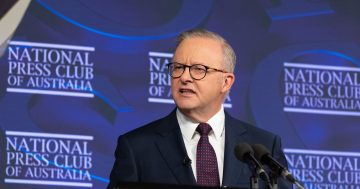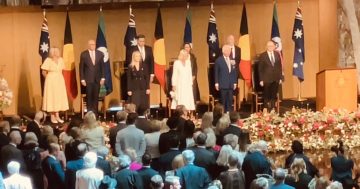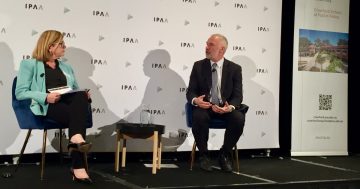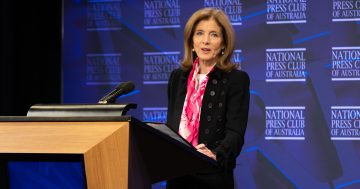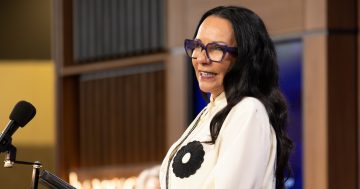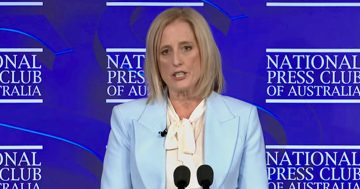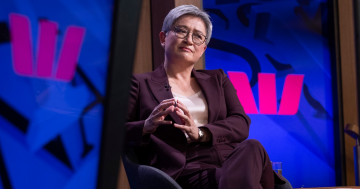
The Health Department’s Sirius building in Woden could destined for a new name. Photo: Ian Bushnell.
On the 25th of January 2007, John Howard began what would turn out to be his last year as prime minister delivering a National Press Club address in the Great Hall of Parliament House to mark Australia Day, which was the next day.
His speech didn’t go much to the actual commemoration of the national day at all – he had policy to announce.
Howard’s address focussed on water security, launching a $10 billion, 10-point plan on a national scale to improve water efficiency and to address the “over-allocation of water in rural Australia”, with a particular focus on the Murray-Darling Basin.
Additionally, he broadcast his intention to establish a special task force (to be chaired by his old rascal mate Senator Bill Heffernan) to examine the potential for further land and water development in northern Australia.
A key focus would be identifying the capacity of northern Australia to play a larger role in agriculture in the decades to come.
It was a good speech, full of promise for what everyone knew was going to be an election year.
And the subject matter was serious, sparking some hefty scrutiny from the Press Gallery journalists in the Q&A session that followed the address.
I was there, working then for the West Australian newspaper, and asked about how water policy fitted into the government’s overall plan to address climate change.
However, as is the case with press club appearances (and pretty much any media conference a PM holds), journalists don’t always stick to the subject matter presented in the speech.
They can ask whatever they want and they do. That’s how it should be.
But this was the prime minister, it was in the Great Hall of Parliament, the National Press Club of Australia hosted it, it warranted a fair degree of respect.
Yet, in good old Aussie style, a young and bold reporter from the Seven Network rose to add some light banter to the occasion.
She referred to how the PM had a bit to say about how history was taught in schools. Then she brought the tone down a little.
She presented the Prime Minister of Australia with an attempt at a gotcha question.
“I just wanted to follow up your comments on Australian history and how it’s being taught in our schools. And on this Australia Day eve, I was wondering if I could have your indulgence and just put you through a mini pop quiz and ask whether you could name any of the ships from the First Fleet?” she said.
Howard replied with an uncertain inflection in his voice, “Sirius?”
Reporter: “Can you name them?”
Howard: “I did. I said, Sirius.”
Reporter: “If you drop by the Seven bureau, I’m sure we can give you a gold star.”
Howard: “You’d give me a gold star, would you?”
Reporter: “Or a cold beer.”
Howard: “Thank you. I’ll take both.”
The PM handled the moment well, even though it was obvious only the name of one of the First Fleet ships had come to mind, and he wasn’t fully confident he even had that one right.
He could have brushed the question off as too silly to answer, but Howard was more classy than that in such circumstances and treated the question and the questioner with dignity.
After the luncheon, however, a bunch of the journos discussed among themselves that one question and the way Howard answered it.
Most of us initially believed that the PM wasn’t saying “Sirius?” but had actually replied, “Serious?” as in, “Are you serious?” with the majority agreeing with that particular sentiment.
That little episode in Australian political history sprung to mind this week with news that the Federal Health Department is seeking staff views on what the new name for its Sirius building in Woden should be.
It seems the Federal Government wants it changed because the First Fleet’s arrival, which marked the beginning of European settlement in Australia, is now regarded by many as the commencement of European invasion.
HMS Sirius was the flagship and was actually named after the star in the Orion constellation.
Some campaigning public servants have objected to the building they work in being in any way associated with colonisation.
It’s becoming more important to some than their actual work in contributing to good health policy.
The government has heard them (or maybe even started the campaign) and is now asking for names that would “be better aligned with the department’s purpose” with a view to a makeover.
But like John Howard all those years ago, we just have to ask, are you “Sirius?”












